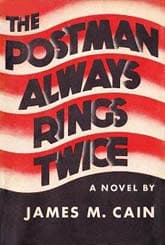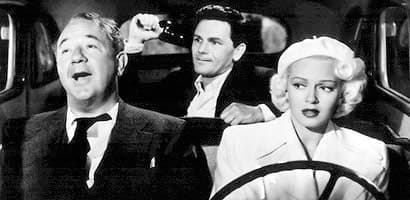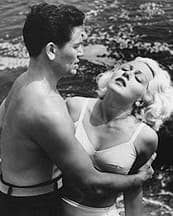The Postman Always Rings Twice
Critique • Quotes • At the movies
 First edition
First editionFirst publication
1934, United States
Literature form
Novella
Genres
Literary, crime
Writing language
English
Author's country
United States
Length
Approx. 38,000 words

Frank (John Garfield) and Cora (Lana Turner) knock off Nick (Cecil Kellaway) in 1946 film.
The Postman in shades of grey
The Postman Always Rings Twice (1946): Film, 113 minutes; director Tay Garnett; writer Harry Ruskin, Niven Busch; featuring Lana Turner, John Garfield, Cecil Kellaway, Hume Cronym, Leon Ames
A year after converting the character study and social critique of James M. Cain's Mildred Pierce into a melodramatic murder mystery, Hollywood did a more accurate job on The Postman Always Rings Twice, already a sleek tale of lust, murder and retribution.
So while Mildred Pierce deserved—needed—a remake, which it finally got very recently, there was no real necessity for a Postman do-over. Which we got 35 years after the original anyway.
Two other versions of Postman had already been made in other languages and under different titles before Hollywood got its hands on it for the first time. Something tells me though, we won't be seeing a third cinematic take on Cain's novella from tinsel town any time soon. It seems ringing twice is more than enough.
Part of the definition of film noir is moral ambiguity. We are led to sympathize with people who react to a politically and economically corrupt world with actions that we wouldn't normally approve of.
In The Postman Always rings Twice (1946), we couldn't get an actor that better brings this out than John Garfield. He could have made a career of playing lowlifes from the other side of the tracks who nevertheless elicit audience empathy. In Postman we know he's no good, and perhaps not too bright, but we like him anyway. If anything, he's almost too likable to be the sleazy drifting Frank Chambers of the novel.
But that's the problem with this film as a book adaptation. It's nearly perfect. Nearly.
Cleaned up
The black-and-white film is faithful to the novel, including all the major plot points surprisingly accurately for its time (especially after the makeover that was done on Cain's Mildred Pierce by Hollywood). Moreover, it gets the cynical tone just about right, picking up quite a bit of Cain's dialogue and converting his quick moving scene into properly moody set pieces in shades of grey.
But the characters are cleaned up for 1940s sensibilities.
The novel's dark-haired, sultry—but pointedly not beautiful—Cora Papadakis becomes the platinum blond Cora Smith on the screen in the person of screen siren Lana Turner. She's incredibly gorgeous, of course, amazingly well-coiffed, and dressed far more glamorously than any other woman who's ever been found cooking in a roadside diner.
But, despite her reputation as a movie sex symbol, Turner is actually quite good here, turning in a nuanced performance as temptress who yearns for something better. We completely believe her as the woman for whose femme fatale charms Garfield falls, and as the spiteful women who turns against him, and much later as the disillusioned Cora suffering remorse and hoping to become a good wife and mother.
The character's name change for the movie, by the way, is due to her husband's name being anglicized in the adaptation. Nick is no longer Greek, but as played by South African-born Cecil Kellaway he is about as white bread as they come. Not the greasy immigrant that Cora complains of, but more of a kindly fuddy duddy. It seems odd though that he doesn't suspect what is going on before his eyes between his wife and the drifter.
The district attorney Sackett (Leon Ames), who tries to get the lovers for murder, has a larger role in the movie, giving the hitchhiking Chambers a ride at the beginning and nosing around after the first "accident". Hume Cronyn has a delightfully jaded turn as their defence lawyer, named Keats now, a less ethnic variation on the novel's Katz.
As might be expected, the movie also cuts down on the suggestions of sadomasochism in the novel's love affair. Frank and Cora don't seem to get off on rough stuff the same way. She doesn't ask him to bite and rip her. We can actually believe they love each other—in their ignorant and fluctuating ways.
Something the movie adds to the novel though is a credible explanation of the title. In the book, postmen go unmentioned. In the film though, Frank makes a nice speech on death row near the end about how punishment for your sins always catches up to you. You might escape it once—as he and Cora did once in court—but karma will try again and get you at home the second time.
It makes sense. But as moviemaking goes, the first English-language adaptation of The Postman Always Rings Twice is the best. In fact, except for a few Hollywood cleanups as expected for those times, it's one of the best adaptations of a modern novel you'll find.
— Eric
Critique • Quotes • At the movies
1946, 1981


